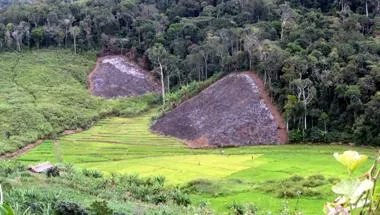
Dr Thomas F. Purcell
Senior Lecturer in International Political Economy
Research interests
- Politics
Contact details
Biography
Tom joined the Department of European & International Studies at King’s College in September 2019. He holds a PhD in Politics from The University of Manchester (2010) and completed a Postdoctoral Fellowship (2011-2013), funded by the Spanish Ministry Education, at the Open University of Catalonia’s (UOC) Urban Transformation and Global Change Laboratory (TURBA Lab). Following this (2013-2015), he was Deputy Director of The National Strategy Centre for the Right to Territory (CENEDET) housed at the state postgraduate University (Instituto de Altos Estudios Nacionales) Quito, Ecuador. Tom also served three years as Senior Lecturer in International Political Economy at Leeds Beckett University.
Research
- Global Political Economy
- Development Studies
- Agrarian Studies
- Financialisation
- Urban Political Economy
Tom’s research spans four principle thematic areas: the political economy of development in Latin America; the relationship between value and rent in global agricultural commodity chains; the ‘financialisation’ of cities and urban infrastructure; and economic and political crisis in Spain and the Eurozone’s periphery. A unifying thread running throughout Tom’s research is a deep methodological and political interest in the territorial, institutional and scalar power relations which permit the production and appropriation of value in the global economy. Tom is interested in the Marxian critique of political economy as a means to transcend disciplinary boundaries, to theorise from the vantage point of the Global South and, most importantly, to interpret real world problems.
Currently, his research is organised around three projects.
- A monograph that will draw together over ten years’ worth of research experience on Venezuela’s Bolivarian Revolution. The book is tentatively titled, “Rentier Revolution: The Rise and Fall of 21st Century Socialism in Venezuela”.
- A collaborative project with Martín Arboleda (Diego Portales University, Santiago de Chile): “City of Foodwebs: Santiago de Chile and the Logistics Revolution in Agriculture.” This project seeks to respond to calls for an expanded conception of extractivism in Latin America by thinking through the intertwined circuits of productive-commodity-money capital in Chile’s agro-food system.
- An interdisciplinary collaboration, with Alex Loftus (King’s) and Hug March (UOC), organised around a recent theoretical contribution termed ‘Value-rent-finance’ (published in Progress in Human Geography, 2019). This project seeks to understand contemporary forms of ‘rentiership’ and value extraction from the enclosure of land, infrastructure and natural resources
Teaching
Tom’s teaching covers Theories of International Political Economy, The Political Economy of Globalisation, Marxism, and The Political Economy of Development in the Global South.
He will be teaching:
- International Political Economy
- Political Economy of Development
- Advanced Topics in International Political Economy
PhD Supervision
Tom welcomes applications for PhD topics related to any of his research interests.
Expertise and Public Engagement
Contemporary Venezuela
The global cocoa sector
Financial investment in the water sector
Agricultural value chains
Tom has written for the public platform The Conversation and provided expert commentary and analysis for radio. He has acted as a reviewer for a range of international academic journals and Cornell University Press (Anthropology and Social Sciences).
Recent Publications
Purcell, T. F. (2023). Common problems or different questions: A critique of ‘assetisation’. Dialogues in Human Geography, OnlineFirst https://doi.org/10.1177/20438206231157885
Arboleda, M. Purcell, T.F and Romero, P (2023) ‘Fossil Food: Landed Property as a Hidden Abode of Global Warming’ Review of International Political Economy, 1-24 https://doi.org/10.1080/09692290.2023.2180769
Purcell, T.F and Ward, C (2022) ‘The Political Economy of Land Value Capture in the UK: Rent and Viability in Salford’s New Municipalist Turn’ Environment and Planning A: Economy and Space (online first) https://doi.org/10.1177/0308518X221131322
Arboleda, M. and Purcell, T.F. (2022) ‘The rentierization of food: regimes of property and the making of Chile’s globalized agriculture’ co-authored with Martín Arboleda, The Journal of Peasant Studies (online first) https://doi.org/10.1080/03066150.2022.2082962
Arboleda, M. and Purcell T.F. (2021) ‘The turbulent circulation of rent: towards a political economy of property and ownership in supply chain capitalism’ co-authored with Martín Arboleda, Antipode 53 (6): 1599-1618 https://doi.org/10.1111/anti.12737
(2019) ‘Value-Rent-Finance’ co-authored with Alex Loftus and Hug March, Progress in Human Geography. https://doi.org/10.1177/0309132519838064
(2018) ‘The Political Economy of Water Infrastructure: An introduction to Financialization’ (co-authored with Alex Loftus and Hug March) WIREs Water https://doi.org/10.1002/wat2.1326
(2018) ‘Hot Chocolate’: Financialized Global Value Chains and Cocoa Production in Ecuador’ Journal of Peasant Studies DOI: 10.1080/03066150.2018.1446000
(2018) ‘Post-Neoliberal Energy Modernity and the Political Economy of the Landlord State in Ecuador’, with Estefania Martinez Energy Research and Social Science 41, pp.12-21 doi.org/10.1016/j.erss.2018.04.003
(2018) ‘The Value of Rents: Global Commodity Chains and Small Cocoa Producers in Ecuador’, co-authored with Nora Fernandez and Estefania Martinez Antipode Antipode 50.3: 641-661. DOI: 10.1111/anti.12380
(2018) Urbanismo utópico, realidades distópicas: una etnografía (im)posible en Yachay, “ciudad del conocimiento” etnográfica, 22 (2): 335-360, co-authored with Miquel Fernandez and Maribel Cadenas DOI : 10.4000/etnografica.5474
(2017) ‘The Political Economy of Rentier Capitalism and the Limits to Agrarian Transformation in Venezuela’ Journal of Agrarian Change 2017; 17:296–312. https://doi.org/10.1111/joac.12204
(2017) Rents, Knowledge and Neostructuralism: Transforming the Productive Matrix in Ecuador, Co-authored with Nora Fernandez and Estefania Martinez, Third World Quarterly 38 (4): 918-938 2017 http://dx.doi.org/10.1080/01436597.2016.1166942
Research

Contemporary Marxism Research Group
The Contemporary Marxism Research Group use the varieties of Marxist theory to analyse the contemporary world, with special reference to political economy and to political and social movements.

Political Ecology, Biodiversity & Ecosystem Services
The Political Ecology, Biodiversity & Ecosystem Services (PEBES) group provides a collaborative focus for work on the social (re)production of nature, environmental conservation and resource management.

Critical Global Capitalism Studies Collective
A collective bringing critical global capitalism research, teaching and activism at King's together under one umbrella to provide a forum for collaborations, events, and discussions, and to forge connections with the media, the policy world, and other like-minded groups.
News
Energy transition could 'perpetuate inequality' if issues aren't addressed
The global transition to renewable energy could perpetuate existing inequalities if issues around land conflicts and financial speculation are not addressed,...

Events

Book Talk on “Crude Capitalism: Oil, Corporate Power, and the Making of the World Market” with Adam Hanieh
Discussion with Adam Hanieh about his new book, Crude Capitalism: Oil, Corporate Power, and the Making of the World Market
Please note: this event has passed.
Features
El Pueblo: Understanding the history behind the contested presidential election in Venezuela
As unrest continues to spread in Venezuela, the Bolivarian Revolution may well be brought to its denouement by the same people that came down from the barrios...

Research

Contemporary Marxism Research Group
The Contemporary Marxism Research Group use the varieties of Marxist theory to analyse the contemporary world, with special reference to political economy and to political and social movements.

Political Ecology, Biodiversity & Ecosystem Services
The Political Ecology, Biodiversity & Ecosystem Services (PEBES) group provides a collaborative focus for work on the social (re)production of nature, environmental conservation and resource management.

Critical Global Capitalism Studies Collective
A collective bringing critical global capitalism research, teaching and activism at King's together under one umbrella to provide a forum for collaborations, events, and discussions, and to forge connections with the media, the policy world, and other like-minded groups.
News
Energy transition could 'perpetuate inequality' if issues aren't addressed
The global transition to renewable energy could perpetuate existing inequalities if issues around land conflicts and financial speculation are not addressed,...

Events

Book Talk on “Crude Capitalism: Oil, Corporate Power, and the Making of the World Market” with Adam Hanieh
Discussion with Adam Hanieh about his new book, Crude Capitalism: Oil, Corporate Power, and the Making of the World Market
Please note: this event has passed.
Features
El Pueblo: Understanding the history behind the contested presidential election in Venezuela
As unrest continues to spread in Venezuela, the Bolivarian Revolution may well be brought to its denouement by the same people that came down from the barrios...

